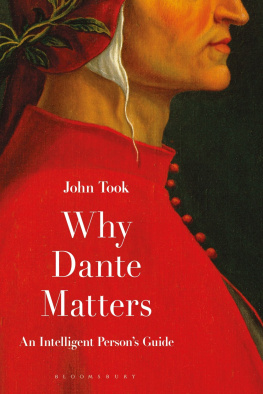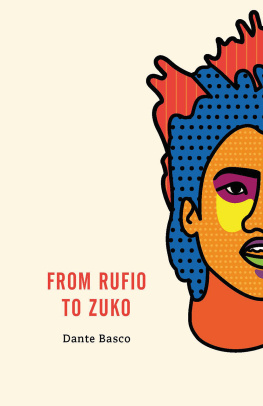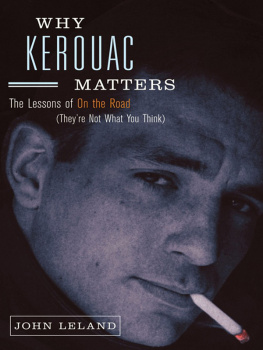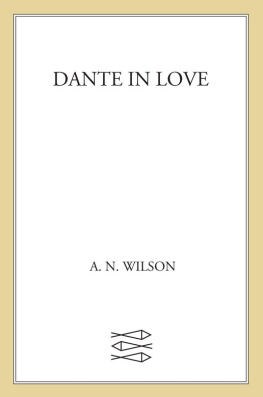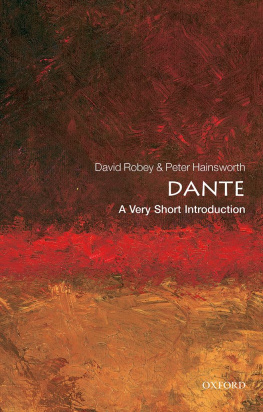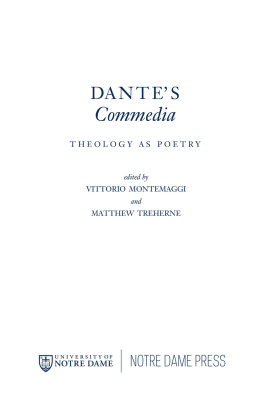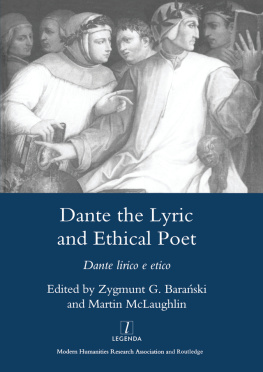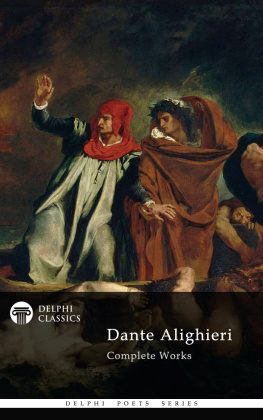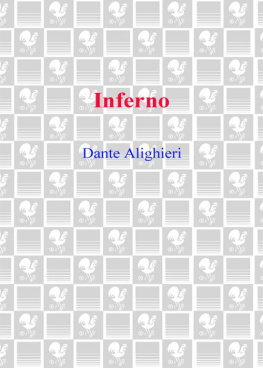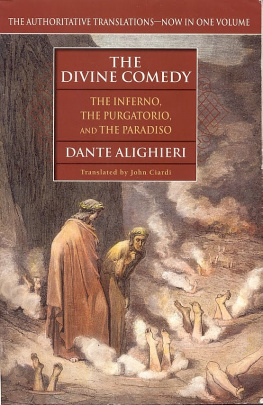John Took - Why Dante Matters
Here you can read online John Took - Why Dante Matters full text of the book (entire story) in english for free. Download pdf and epub, get meaning, cover and reviews about this ebook. publisher: Bloomsbury Publishing, genre: Science. Description of the work, (preface) as well as reviews are available. Best literature library LitArk.com created for fans of good reading and offers a wide selection of genres:
Romance novel
Science fiction
Adventure
Detective
Science
History
Home and family
Prose
Art
Politics
Computer
Non-fiction
Religion
Business
Children
Humor
Choose a favorite category and find really read worthwhile books. Enjoy immersion in the world of imagination, feel the emotions of the characters or learn something new for yourself, make an fascinating discovery.
Why Dante Matters: summary, description and annotation
We offer to read an annotation, description, summary or preface (depends on what the author of the book "Why Dante Matters" wrote himself). If you haven't found the necessary information about the book — write in the comments, we will try to find it.
Why Dante Matters — read online for free the complete book (whole text) full work
Below is the text of the book, divided by pages. System saving the place of the last page read, allows you to conveniently read the book "Why Dante Matters" online for free, without having to search again every time where you left off. Put a bookmark, and you can go to the page where you finished reading at any time.
Font size:
Interval:
Bookmark:


In memory of Kenelm Foster, OP (191086)
Spe sociae exultationis

It is indeed a question of whether the peculiar contemporaneousness of the work of art does not consist precisely in its being open in a limitless way to ever new integrations. The creator of a work of art may intend the public of his own time, but the real being of his work is what it is able to say, and this being reaches fundamentally beyond any historical confinement. In this sense, the work of art occupies a timeless present.
Hans-Georg Gadamer
The greatest poetic expression of the Existentialist point of view in the Middle Ages is Dantes Divina Commedia . It remains, like the religious depth psychology of the monastics, within the framework of the scholastic ontology. But within these limits it enters the deepest places of human self-destruction and despair as well as the highest places of courage and salvation, and gives in poetic symbols an all-embracing existential doctrine of man.
Paul Tillich
In fondo, una seriet terribile
Gianfranco Contini
Contents
In addition to the many students both at University College London and latterly at the Warburg Institute who, having listened attentively, have by way of their generous response encouraged me to look ever more deeply into the matter, I have to thank Robin Baird-Smith of Bloomsbury Publishing for his kindness and courtesy in encouraging this project, and, as always, my wife Patricia for her companionship and forbearance.
Preface:
Preliminary confession
Forse ancora per pi sottile persona si vederebbe in ci pi sottile ragione; ma questa quella chio ne veggio, e che pi mi piace.
( Vita nova xxix.4)
Provided only that it deliver the goods, the Introduction following hard upon the heels of this preface will, I hope, make it clear what this fresh meditation on Dante sets out to do namely to confirm how it is that, over and beyond his status as a cultural asset and indeed as a cultural icon, he still matters to us. The undertaking, I know, is problematic, not least in that like all the great representatives of our tradition be it Shakespeare in the sphere of letters, Rembrandt in the sphere of portraiture or Beethoven in the sphere of music Dante matters in as many different ways as those entering into his presence. What follows, then, far from being yet another account of his life and work, is simply my own sense of how it is that, every more specifically historical consideration apart, he enters still into communion with all those busy at the point of ultimate concern, of what in truth it means to be under way on the plane of properly human being. While, then, others of greater discerning may see here matters of still greater moment, that is what I myself see and that is what pleases me most.
John Took
University College London
Introduction:
Dante and the Existential Point of View
DANTE AT THE POINT of ultimate concern Dante: who, what, where and when? course of the argument.
Why, then, does Dante matter?
In truth, for any number of reasons: for the theologian by way of his proceeding in terms not of the proposition pure and simple but of the agony and ecstasy of spiritual journeying, of the I-self anxious in respect of his or her coming home as a creature of ultimate accountability; for the philosopher by way of his particular brand of Christian Aristotelianism and of the possibility this holds out of a unique form of properly human happiness here and now; and for the rhetorician by way of his sense of the word as but the intelligible form of this or that instance of specifically human being in act and of the image not now as a matter of elaboration or adornment in respect of the plain sense of the text, but as a first port of call when it comes to laying open the how it stands and how it fares with the individual (Martin Heideggers wie einem ist und wird) at the point of self-losing and self-finding.
But to speak in this way of what amounts to the high-level concerns of the text to a setting up of the theological issue, that is to say, in terms of the more or less anxious I-self, of the philosophical preferences of the day, and of the word and of the image as that whereby the individual knows self and is in turn known in the truth of his or her presence in the world as a creature of moral and intellectual determination is already to point on to what actually and ultimately matters about the Dantean utterance, namely its taking up of every specifically cultural inflexion of the spirit in a meditation upon the positive being there of the individual in the fullness of his or her proper humanity. Short of this of this commitment to the being there of self in the fullness of its proper humanity and to this as but the first and final cause of every spiritual striving the text lives on as a matter merely of historical interest, as but the more or less predictable product of its immediate circumstances. Sensitive, by contrast, to as Dante himself puts it at one point the butterfly-emergence of the one who says I, it straightaway transcends those circumstances in favour of something still more resplendent, of a nothing if not lively encounter with all those past, present and as yet unborn engaged at the point of ultimate concern.
But with this we are getting ahead of ourselves, for if only by way of honouring the kind of otherness always and everywhere entering into sameness as the condition of good conversation we need to pause for a moment over Dante himself, over the who , what , where and when of his own presence in the world.
Dante was born in Florence in 1265 under the sign of Gemini to a White Guelph family of erstwhile comfortable though in recent times of more modest means. Of his childhood and early education we have little to go on other than by way of inference and probability: of inference in the sense of a child doubtless more than ordinarily responsive to the sights and sounds both of the city and of the Florentine countryside and of this as making in turn for a lively imagination and love of myth and of mythmaking, and of probability in the sense of a preliminary initiation in the area of reading, writing and arithmetic with access further down the line to texts such as the Disticha Catonis or the Liber Esopi or the Elegia of Arrigo Settimello as likewise part of an elementary curriculum. But more decisive still, certainly as time went on, was the personal encounter, the presence to him of the poet, encyclopaedist and civic dignitary Brunetto Latini and of the poet and philosopher Guido Cavalcanti, the former in respect of a certain kind of pre-humanism or preliminary encounter with the poets, philosophers and rhetoricians of old, and the latter in respect both of the style and of the substance of versifying in the vernacular, both of the accountability of form to content within the economy of the whole and of the precise nature of love in its twofold substance and psychology. But neither, as far as his formation as a philosophical spirit was concerned, was that all, for in the wake of Beatrices death in June 1290 (a matter to which we shall come in due course) he sought consolation in the theological schools of Santa Maria Novella, of Santa Croce and, on the other side of the river, of Santo Spirito, the sermons, lectures and disputations thereof respectively Dominican, Franciscan and Augustinian in complexion serving further to shape and substantiate his ever more complex spirituality.
Font size:
Interval:
Bookmark:
Similar books «Why Dante Matters»
Look at similar books to Why Dante Matters. We have selected literature similar in name and meaning in the hope of providing readers with more options to find new, interesting, not yet read works.
Discussion, reviews of the book Why Dante Matters and just readers' own opinions. Leave your comments, write what you think about the work, its meaning or the main characters. Specify what exactly you liked and what you didn't like, and why you think so.

